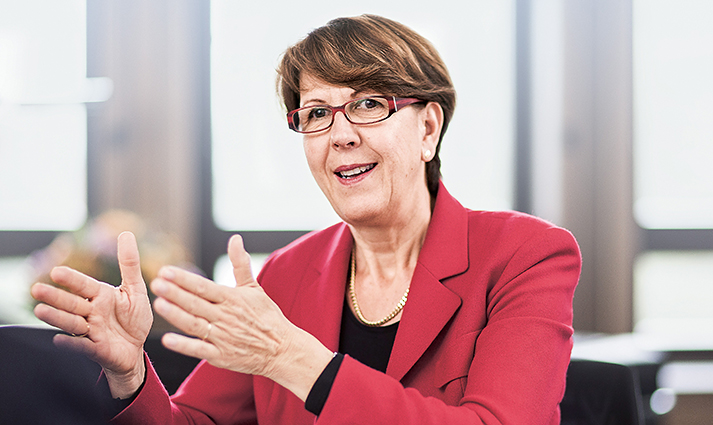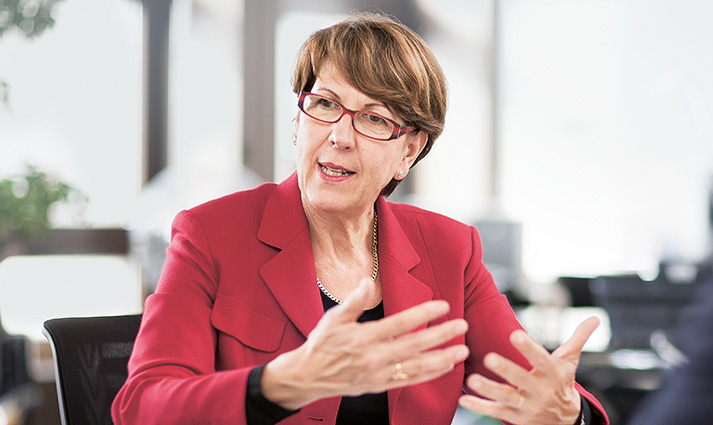Interview
Interview with Susanne Ruoff, CEO

Last year, Swiss Post ceased to be a federal public institution and is now a public limited company. Ms Ruoff, what does this mean for the universal service?
Susanne Ruoff: The Confederation now requires Swiss Post to fulfil universal service obligations for postal services and payment transactions. We do both to a high level of quality and using our own resources. We continue to offer Swiss residents the densest network of access points in Europe, particularly of our own post offices, and at least one letter box in every town and village. We deliver letters and magazines six days a week instead of the required five, exceeding the requirements set down by lawmakers.
What about the quality of services?
Last year, 97.6 percent of A Mail letters were delivered on time. The rate for B Mail was even higher, at 98.8 percent of all letters. For parcels, we achieved similarly high results.
In its first activity report, PostCom, the new Federal Postal Services Commission, highlighted the very high quality of services provided by Swiss Post, citing the public's satisfaction with the services provided. This is borne out by the results of our customer survey, in which we received a total of 80 out of a possible 100 points, up on the previous year's figure of 79 points. In the parcels market, we've been faring well against strong competition for years thanks to the quality of our services. As shown by a study of price trends and quality among 15 European postal service providers, Swiss Post is also very well positioned with its prices. In other words, the Swiss public benefit from top quality services at affordable prices.
Has Swiss Post developed new products and services for its customers?
It is safe to assume that our customers are interested in the expansion of our services in the growing e-commerce market where we are offering them new, innovative products along the entire value chain. We are also developing an electronic letters platform. This reflects our vision of a future in which every resident of Switzerland can decide whether they want to receive their mail as a physical letter on paper or in electronic form on their computer, tablet or mobile phone. Our staff have been testing this product since the end of last year, allowing us to gather useful experience. By doing so, we are responding to rapid changes in how our customers are communicating.
How exactly have customers' habits changed?
The change in customer habits goes hand in hand with the technological development that has permeated every area of life and the economy. A growing number of our customers are permanently online, communicate using electronic channels, and want to be able to use services immediately, wherever they are. They cultivate a mobile lifestyle that is expressed in many ways, including new work practices. It is important to them to have a high degree of self-determination and individuality.
What does this change in customer behaviour mean for Swiss Post?
It means for instance that we need to adapt the universal services we provide to these new requirements. One thing we have done in recent years is to expand our range of agencies with longer opening hours, helping us achieve significantly higher marks in the 2013 customer survey. As a result of the changes in customer behaviour, however, our letter volumes continue to decline by 1 to 2 percent per year, and the number of over-the-counter inpayments is also falling. PostFinance's electronic and mobile services, on the other hand, are enjoying increasing popularity, and we are benefiting from the boom in online business, which is generating continually rising parcel volumes. Our strategy is to defend our core business and create new growth opportunities wherever possible.

How are you specifically implementing your strategy?
In e-commerce in particular, we have a unique set of skills that we can use to develop our business. As a diversified company, we offer all-in solutions to companies looking to get into online trading. For instance, these solutions might include the direct marketing of a service, a webshop, payment, picking, and of course delivery of the goods and the management of returns. With these services, we allow our customers to focus on their core business. For the recipients of the ordered goods, we make the parcels intelligent. They can choose online where and when they want to receive their parcels: at home, in the office, at one of our new parcel terminals, at a PickPost point at a railway station or petrol station, or at one of our post offices.
Electronic letter boxes, e-commerce: will Swiss Post exclusively provide online services in a few years' time?
The physical delivery of letters and parcels is and will remain our core business. But we are supplementing this core business with new electronic services. These include document lifecycle management, in which we take care of complete communication processes for our business customers – from the digitization of incoming mail to its management and archiving through to the physical or electronic delivery of documents. We want to turn Swiss Post into an information hub between the physical and digital worlds. Or to put it another way: Swiss Post creates contemporary services for today's information society with enhanced physical, hybrid and electronic services.
Is Swiss Post also venturing into new markets outside its core business?
We are also developing innovative services in new business areas – although they do always complement our core competencies. One example of this is the electronic patient record vivates, which is already being used or tested in the cantons of Geneva, Vaud and Ticino. vivates is another information hub – for patients, doctors, nurses and other stakeholders in the health sector. Solutions like these draw upon Swiss Post's expertise as a secure and reliable bearer of information and on its formidable technical know-how.
Do PostFinance and PostBus also rely on digital services?
PostFinance's electronic services make it extremely easy for its customers to manage their money. It was the first bank to allow its customers secure mobile login to e-banking using a smartphone with a special SIM card. In a pioneering move, PostBus now provides its passengers with free Internet access during their journey.
This all sounds very technical. Are the customers as people no longer important?
Not at all. Behind every technical solution are the needs of people, by which I mean our customers. The main focus in everything we do must be on our customers. Incidentally, this is one of my key messages to our employees.

What does your requirement for customer focus specifically mean?
Employees who are in direct contact with the customer are vital: PostBus drivers, delivery personnel, salespeople in the post offices, PostFinance advisors, customer service and our webmasters. Put together, all of these people have about one million personal customer contacts every day. That represents a huge opportunity to leave a lasting positive image of Swiss Post and to develop a sense of customer requirements. Feedback is taken very seriously. But for me, customer focus also means working directly with business customers to develop new company-wide solutions. In this area, we have initiated a number of innovative projects.
You want to encourage employees more strongly in general. Why?
Our 62,000 or so employees come from 140 nations, work in more than 100 different professions, are of different ages, have the most diverse experiences and have learned to meet challenges in many different ways. They are also, as our annual surveys show, highly motivated. We want to tap into this enormous potential to develop new services and to work more efficiently. Our new leadership principles, the key aspects of which are personal responsibility, flexibility for the entire company and trust in people, help us to do this.
Does the conversion of Swiss Post into a public limited company have implications for its employees?
The new postal legislation requires Swiss Post to negotiate a new collective employment contract with the unions within two years. It is very important to me to ensure that both the interests of the company and the concerns of employees are respected in that contract. The new collective employment contract is intended to create a framework in which Swiss Post can remain competitive in the long term. After all, there is no better way to secure attractive, long-term jobs than with a competitive, successful company. This requires flexibility. The success of Swiss Post is based on the day-to-day efforts and huge commitment to service from our employees. For that, I would like to thank them sincerely.
The main focus in everything we do must be on our customers.
We are also developing innovative services in new business areas – although they do always complement our core competencies.